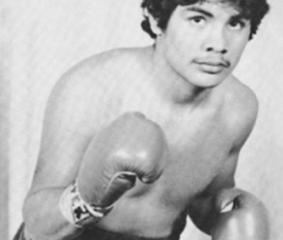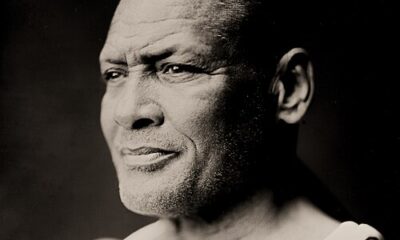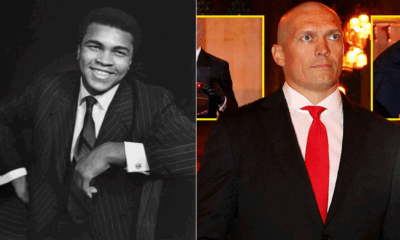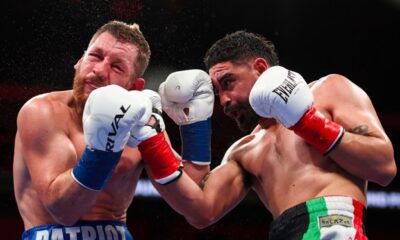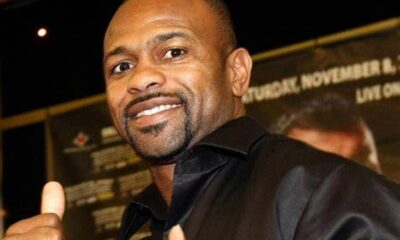Featured Articles
Arne’s Almanac: Betting Scandals in Boxing; Two Vivid Specimens

Arne’s Almanac: Betting Scandals in Boxing; Two Vivid Specimens
Sports gambling has been in the news lately and for all the wrong reasons. College and pro basketball and major league baseball have been tainted with betting scandals. Most are not conventional scandals from a historic standpoint, instead centering around player “props” and in-game wagering, but the effect is the same; a loss of trust in the integrity of the competitions.
Boxing hasn’t been smirched by the latest developments, but the sport, needless to say, has been rife with corruption. The greatest boxing scandal, in terms of the severity of the backlash, happened in 1900. A scandal also shrouded the richest fight of all time, Mayweather vs. Pacquiao, although the furor died down quickly and there were no lasting repercussions.
1900
On Dec. 11, 1900, Brooklyn’s “Terrible” Terry McGovern, recognized as the world featherweight champion, fought Baltimore’s Joe Gans in Chicago. This was a non-title fight slated for six rounds, the limit in Chicago. Nonetheless, it was a huge attraction. Gans wouldn’t win the lightweight title for another two years when he stopped Frank Erne in the opening round but, at age 26, the man who would come to be revered as the “Old Master” was in his prime and recognized by the cognoscenti as a fighter of consummate skill. McGovern, only 20 years old, was a phenom, a knockout artist who was the Mike Tyson of his day, albeit a smaller and Caucasian version of the future heavyweight phenom.
In his pre-fight story, George Siler, the syndicated boxing writer for the Chicago Tribune who would be the third man in the ring, wrote that McGovern vs. Gans was “the most important fight in Chicago fight history.” Another measure of the fight’s allure was the venue. It was parked at Tattersall’s. A glass-roofed equestrian theater built by a British consortium, the place consumed an entire city block and was big enough to house a football game. (The University of Chicago “11” played the Notre Dame Fighting Irish at Tattersall’s on Jan. 1, 1894, a day that would become synonymous with college bowl games. For the record, Chicago won 8-0.)
The Articles of Agreement specified that McGovern, the smaller man, would be declared the winner if he was still standing at the finish. Those that bet on Terrible Terry had no sweat. Gans was on the deck seven times in barely five minutes of fighting before referee Siler halted the match at the 2:05 mark of round two. The punches that knocked Gans off his pins did not appear to land with any significant force.
Siler was familiar with Gans. The previous month, he had refereed Gans’ fight with Kid Parker in Denver, a rout for the Baltimore man who crushed his well-respected but overmatched opponent in four rounds. Speaking to the press after the McGovern fight, Siler said that he didn’t think Gans was trying. Factor in the fact that Gans’ manager Al Herford had an unsavory reputation and Gans’ protestations that he tried his best fell on deaf ears.
This reporter has argued that throughout history there have been very few fixed fights, far fewer than one would have surmised from the literature and from boxing-themed movies. The reference here is to the stereotypical fixed fight, a fight with a prearranged outcome for the purpose of a betting coup. Of all the alleged fixed fights, however, this one is the hardest to discredit because it generated so much “unnatural money.”
Bookmakers were inundated with action from people they had never seen before. Their regular patrons were inclined to wager more than was their custom. Virtually all the money was on McGovern. Even members of Chicago’s thick colony of Pullman porters were placing their coin on the white guy, or so it was written. (The Pullman company was headquartered on Chicago’s South Side.)
The Backlash: The Chicago City Council, at the behest of the Mayor, refused to issue any new boxing licenses which had the effect of killing the sport in America’s second-largest city. There would be no more fights at Tattersall’s which was torn down in 1910 and there wouldn’t be another fight of significance inside the city limits of the Windy City until 1926 when Sammy Mandell, the “Rockford Sheik,” wrested the world lightweight title from Buffalo’s Rocky Kansas at Comiskey Park, a prelude to the grand spectacle the following year, the Dempsey-Tunney rematch — and those two bouts were restricted to 10 rounds.
The Mayweather-Pacquiao Scandal
The May 2, 2015 match between Floyd Mayweather Jr and Manny Pacquiao at the MGM Grand in Las Vegas is the highest-grossing prizefight in history by a substantial margin. The revenue from the live gate amounted to $72,198,500. (To put that in perspective, the recent bout between Terence Crawford and Canelo Alvarez, although witnessed on site by more than four times as many people, reportedly garnered “only” $47 million in ticket sales.) All told, Mayweather vs Pacquiao brought in more than $600 million.
The fight also spawned at least 32 class action lawsuits alleging fraud.
“I don’t want to make alibis or anything,” said Pacquiao in his dressing room after the fight, “[but] it’s hard to fight one-handed.”
Pacquiao, who was widely out-pointed (118-110, 118-110, 116-112), was alluding to a shoulder injury, a torn right rotator cuff, an injury suffered in training four weeks before the match, an injury concealed from the media and from the Nevada Athletic Commission which wasn’t made aware of the impairment until two hours before the fight when Pacquiao requested an injection of an approved anti-inflammatory, a request that was turned down.
“Had I known [Pacquiao] was going to fight Mayweather using only one hand, I would have bet the house on Mayweather. Likewise, I would not have paid $99.95 to watch it on pay-per-view. I think the public was deceived, and I truly believe there is grounds for an investigation of Pacquiao and his team for fraud. This is tantamount to ‘insider trading’ in the stock market,” wrote an Arizona resident in a letter that was published in both Las Vegas dailies.
Others were more caustic, such as Irish scribe Tommy Conlan who covered the fight for the Dublin Sunday Independent. “It was another shakedown from the sport’s incorrigible hucksters,” said the disgruntled Conlan who apparently bet on the fight, telling his readers that he was suckered.
Was Mayweather informed of the injury? Likely not, but a rumor surfaced that he had a spy in Pacquiao’s camp and he targeted Pacquiao’s injured shoulder during the contest.
Although Pacquiao was investigated for perjury by the office of Nevada’s Attorney General – he had checked “no” to whether he had an injury in the box on his obligatory pre-fight questionnaire — nothing came of it and, likewise, the lawsuits died on the vine. The brouhaha will inevitably be re-visited if/when (likely when) there is a rematch.
—–
The U.S. Supreme Court opened the floodgates in 2018 when it overturned Nevada’s monopoly on legal sports wagering. On Dec. 1, Missouri will become the thirty-ninth U.S. state to offer sports betting, the thirtieth to permit mobile sports betting, effectively allowing any adult with a smart phone to have a bookmaker in the pocket of his pants.
Big fights now attract more betting than ever, an inevitable outgrowth of the Supreme Court decision and of the scrum for market share currently being waged by behemoths Draft Kings and Fan Duel and their many competitors. What this means is that corroboration of duplicity in a fight of major import might flare into a harsher backlash than we have ever seen, degrading the Sweet Science into even more of a niche sport. True, boxing is resilient — if one had a quarter for everyone who said boxing was dying, one would have enough quarters, if stacked one on top of the other, to reach the top of the Empire State Building — but the custodians of the sport, if there are such people, had best be vigilant.
TSS editor-in-chief Arne K. Lang is the author of five books including “Sports Betting and Bookmaking: An American History” (Rowman & Littlefield, 2016).
To comment on this story in the Fight Forum CLICK HERE
-

 Featured Articles3 weeks ago
Featured Articles3 weeks agoSebastian Fundora: The Towering Inferno’s Ascent in the Sweet Science
-

 Featured Articles3 weeks ago
Featured Articles3 weeks agoAnthony Joshua Discharged from Hospital After Fatal Nigeria Car Crash — Latest Updates
-
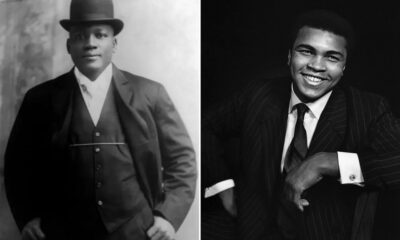
 Featured Articles4 weeks ago
Featured Articles4 weeks agoDecember 26: This Day in Boxing History — Jack Johnson, Muhammad Ali, and Global Heavyweight Legacy
-
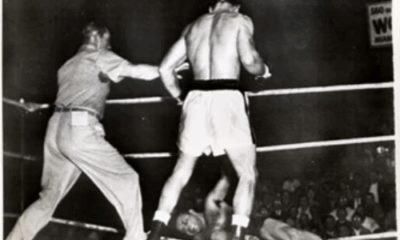
 Featured Articles3 weeks ago
Featured Articles3 weeks agoDecember 31: This Day in Boxing History — Legends Were Tested and Titles Changed Hands
-

 Featured Articles3 weeks ago
Featured Articles3 weeks agoAmanda Serrano Wins Action-Packed Decision and Other MVP fight results
-
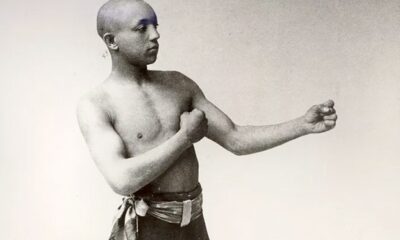
 Featured Articles3 weeks ago
Featured Articles3 weeks agoDecember 28: This Day in Boxing History: The Enduring Legacy of George Dixon
-

 Featured Articles3 weeks ago
Featured Articles3 weeks agoAnthony Joshua Injured in Fatal Car Crash in Nigeria
-
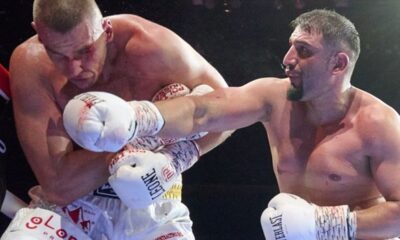
 Featured Articles2 weeks ago
Featured Articles2 weeks agoAgit Kabayel Rallies to Stop Damian Knyba, Claims Interim WBC Heavyweight Title



